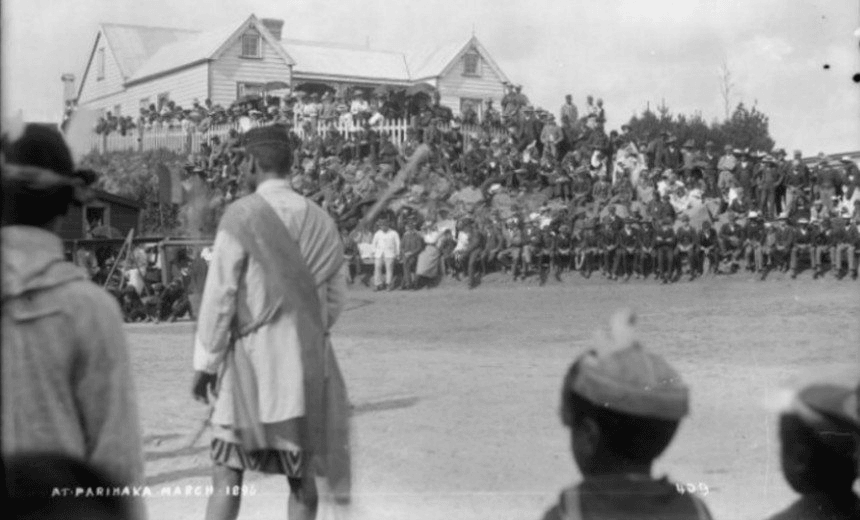All week this week the Spinoff Review of Books looks at Scott Hamilton’s brilliant new book, The Stolen Island, his investigation into the people-snatching raid on the Tongan island of ‘Ata. Today: Leilani Tamu writes, “When the slavers came, they took more than our men. They raped our women. Beat our children. Pissed on our ancestors. Pissed on us.”
Between 1842 and 1904 the so-called “Blackbirding” trade was alive and well throughout the Pacific region. Thousands of Pasifika and Aboriginal peoples were coerced and kidnapped before being trafficked as indentured-slave labour. Yet this significant part of our regional history is not widely known, let alone taught in New Zealand schools. That very fact, in and of itself, speaks volumes about the kind of knowledge that is valued (or not) in our society.
When the slavers came, they took more than our men. They decimated our communities. Raped our women. Beat our children. Pissed on our ancestors. Pissed on us.
Read more about Tonga’s lost island of ‘Ata:
‘They have six fingers on their hands’: Part 1 of the strange story of Tonga’s lost island of ‘Ata
A masterpiece of Pacific story-telling: Part 2 of the strange story of Tonga’s lost island of ‘Ata
They did it because they saw themselves – and their interests – as being worth more than our humanity. They justified their actions by applying an imperial gaze that affirmed their ‘rights’ and ‘interests’ as ‘superior’ to ours. Largely because we were perceived as ‘different’ to them. Our customs were different. Our spiritual beliefs were different. And the way we looked was ‘different’. Our identity was used against us to justify abhorrent acts undertaken because we were perceived as ‘less’. That’s what nineteenth century ‘identity politics’ looked like.
In recent months, as the ashes from the Trump-o-calypse have started to settle, there has been much talk about the role and relevance – if any – that ‘identity’ politics has in the Left movement. The context for these discussions has largely been around the idea that tension exists between those who advocate for ‘identity’ to be a central tenet of leftist political ideology and those who advocate for ‘class’.
While there have been varying takes on this theme – with a number of commentators countering that the idea of ‘intersectionality’ is what’s important – I would like to suggest that having a thorough understanding of the social, cultural and economic implications of imperialism is actually what’s key.
Take our region for example. I look around me and I see imperialism’s signature scrawled all over Pasifika socio-economic indicators. The ink is still wet.
The implications of this are that many of the ingrained and institutionalised assumptions that have shaped decisions about what is considered to be ‘important’ or ‘of value’ in, for example, our law, health and education systems, affirm imperialism and therefore inequality.
As public policy practitioner I have seen this first-hand. As a Pasifika woman I see this first-hand. That doesn’t make me an ‘identity’ politician. It just means that I refuse to accept imperial assumptions that place ‘Western’ knowledge as superior to indigenous knowledge – particularly matauranga Māori.
To give but a few small but significant examples of how these assumptions continue to shape decisions – why does the New Zealand Herald not use a macron over the ‘a’ when they publish the word Māori? What does this decision say to the over 100,000+ readership? Why is te reo māori not offered in all schools? What does this say about the value we place on te reo as a society? Why are our street signs not bilingual?
There may be one reason for each of these, there may be many. But for me the reasons (or excuses) aren’t important – the implicit messaging that emanates these lived realities is what’s important. It’s important because it is indicative of the extent to which imperialism is still hardwired into the assumptions and practices that are taken for granted as ‘normal’ in large parts of our society. It is important because it is indicative of the extent to which value is still placed primarily on ‘western’ knowledge which then consequently shapes the way we, think and participate in our societies.
Our identities and experiences are therefore inherently tied to imperial politics, and therefore inequality. Put simply the issues we need to address as a society aren’t just about identity or just about class. They are about power. And we all have a responsibility to address this. Because unchecked imperialism provides a platform for identity to be used as justification for oppression. And that is something none of us should accept. So next time you read or hear someone going on about the problem with the Left movement being about ‘identity’ politics – I ask that you politely point out to them that if they really want to make a difference – they might want to focus on imperial politics first.
The Stolen Island: Searching for ‘Ata (Bridget Williams Books, $14.99) by Scott Hamilton is available at Unity Books.

